
Professor Munjal (India): "Fond of Russia, eager to learn Russian!"
/ Главная / Russkiy Mir Foundation / Publications / Professor Munjal (India): "Fond of Russia, eager to learn Russian!"Professor Munjal (India): "Fond of Russia, eager to learn Russian!"
India is currently witnessing a revival of interest in the Russian language and culture. For instance, students of natural sciences are eager to attend courses on Russian culture and folklore at Delhi University. Dr. Girish Munjal, translator and head of the Russian language section of the Slavonic and Finno-Ugrian Studies Department at Delhi University, discusses the steps needed to promote such interest.
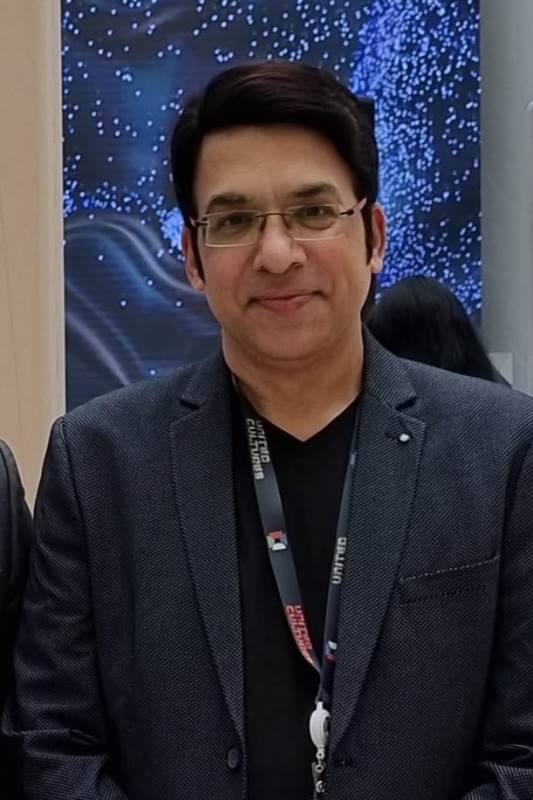
Girish Munjal
– You speak Russian very well. Why did you decide to study it? What inspired your choice?
– I graduated from university in the 1980s. A movie based on War and Peace by Leo Tolstoy was broadcast in English on national TV back then. My knowledge of the Soviet Union used to be limited to the fact that Moscow was the capital of the USSR. However, having watched War and Peace, I was keenly interested in Russia's history and culture. Shortly thereafter, I saw a newspaper ad for a Russian language course at Jawaharlal Nehru University. I joined the course, and it turned my whole life around. My major was biochemistry, and Russian was my hobby at first. However, it is a well-known fact that if you take up something as a hobby, finally you master it better than your main occupation.
Then I got a master's degree in Russian language, defended my thesis at Jawaharlal Nehru University, and studied in Russia several times. My first internship was still in the Soviet Union in 1989. I was lucky enough to get one of the last USSR scholarships. Having completed my master's, I started teaching Russian at my university and at the Institute of Russian Language at the Russian Cultural Center in Delhi, and then I got a job at the Department of Slavonic Languages, Delhi University.
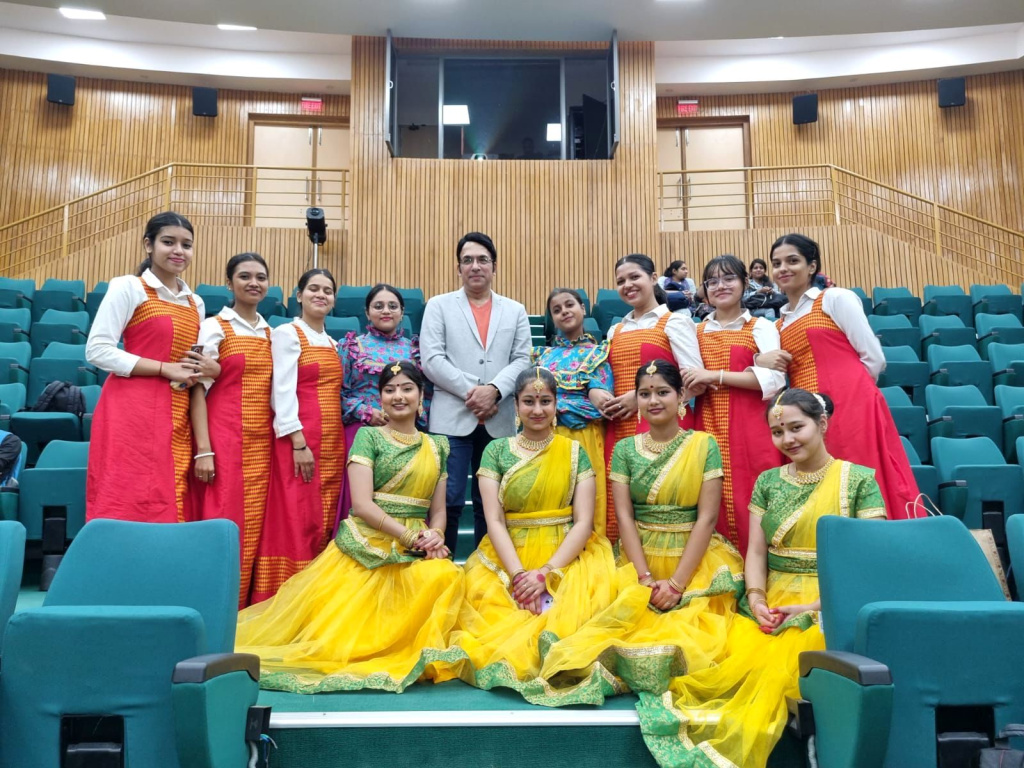
Dr. Munjal and Russian language students at Delhi University
– Was this department established back in the Soviet Union time?
– The Russian language has been taught at Delhi University since 1946. It is the oldest Russian language department in India. The Department of Slavonic Languages was established on its basis in 1987. Nevertheless, the Russian language section is still the largest one offering master's and post-graduate degrees, and a 4-year bachelor's program will be launched in 2024. As for other languages, there are only courses. Currently, the department has 316 students; 280 of them study Russian. There were more students during the Soviet era, as a lot of scholarships were available to continue their education in the Soviet Union. After the USSR collapsed, scholarships were no longer granted, and fewer students enrolled. Yet, I can say that today there is a very great interest in the Russian language and culture.
– What motivates students studying Russian today?
– First, we all are fond of Russia and just want to learn the Russian language. If you speak Russian, you can easily find a job. This is a strong motivation, as well. Often our students work as interpreters in medical and tourist establishments. This is quite in demand nowadays.
– So there are many patients from CIS countries coming to Indian clinics, aren't there?
– Today, nearly every Indian hospital has an international unit. A lot of patients are from Central Asia. People come for treatment from Russia, as well. Of course, all these patients use Russian as their language of communication.
The Ministry of Defense also needs translators on an ongoing basis as there are many contracts with Russia. Such companies as BrahMos Aerospace, also require translators. Sberbank has opened branches in India and employed our graduates.
– Are there any student exchange programs between Delhi University and Russian universities?
– Unfortunately, there is no. However, we would really like such exchanges to take place. There have been many changes in our education sector. For instance, only Indian nationals can now be offered permanent employment. Previously, we used to invite teachers from Russia and many of them lived in Delhi.
I raise this critical issue at every opportunity because we need native speakers of the Russian language. There is one vacancy for a guest teacher for other languages. Teachers come from Poland, Bulgaria, Croatia, Hungary, and the Czech Republic. As to inviting a Russian teacher, there are still problems for some reason. When I started working, we had Russian teachers. I would like this practice to be resumed as it is very important. My generation of students was lucky to have teachers from the Soviet Union using excellent methods of teaching Russian. That's why, perhaps, my Russian is that good.
– That's true, I can't hear any accent at all!
– I do my best…
– Do students have an opportunity to continue their studies in Russia?
– Yes, there are scholarships available for Indian students. Last year, I think, more than 200 students went to Russia to study for free. Rossotrudnichestvo assists in attracting students. That's very good. However, on the other hand, I fear that you will take all our best students.
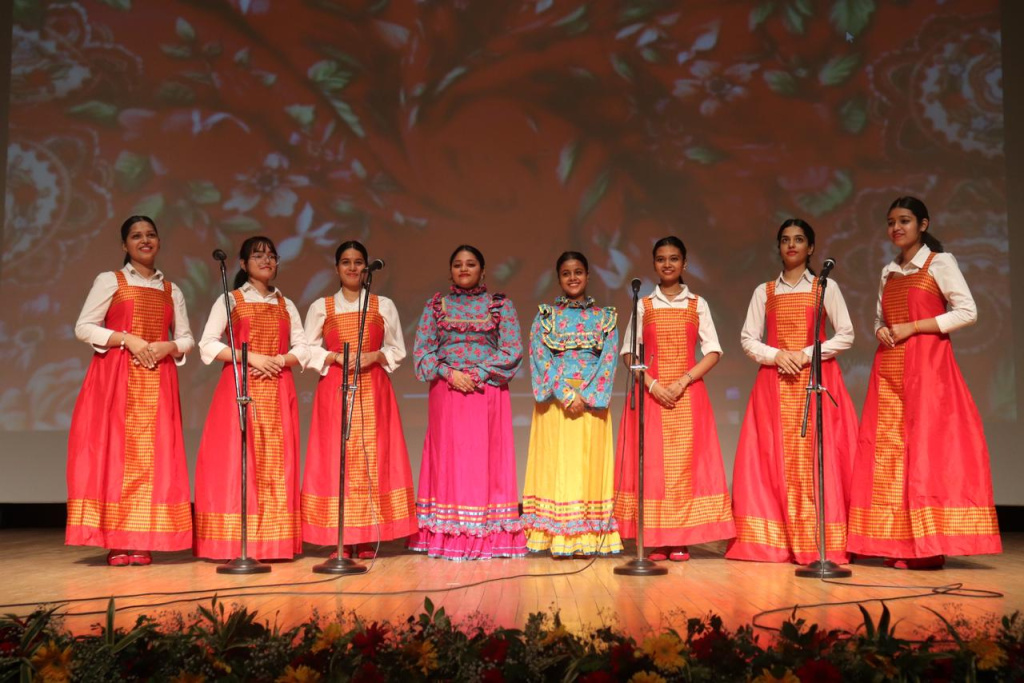
Delhi University students perform Russian program. October 2023
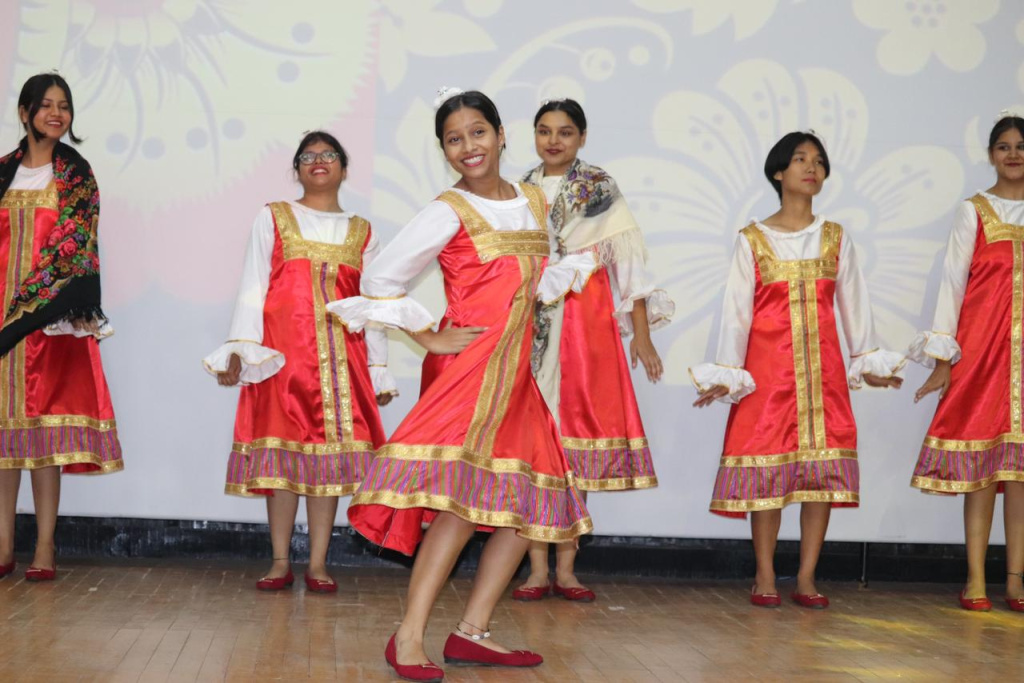
Read also: How Soviet children’s books became collectible items in India
– They do come back, don't they?
– Sometimes. Many of them stay in Russia. They continue their studies or find work there.
– Is the Russian language taught in Indian schools?
– Unfortunately, there is only one private school in Delhi where Russian is taught. During the USSR era, there were many such schools. We organize regular events on Russian language and literature at this school. I read my translations of Leo Tolstoy's works to the students. They were very enthusiastic and shared their reviews. This is a very prestigious international school attended by the children of the elite.
Of course, it would be nice if the Russian language was also taught in public schools. Obviously, teachers and textbooks are required for this purpose. By the way, the above private school also needs textbooks as the children study according to the old program. Currently, we do our best to solve this problem in cooperation with the Russian House.
– Encountering the Russian classic, War and Peace, contributed to your destiny. Russian classical literature was actively translated into Hindi during the Soviet era. Does this trend continue in any way today?
– Yes, there was the Raduga Publishing House in the USSR that focused on translations for other countries. Many translators worked there, and they published Russian writers' works in Hindi. Nowadays, it is possible to get grants for translations. This way I translated the works of Vasily Shukshin into Hindi. The grant was provided by the Institute of Translation. Currently, I am translating children's stories by Leo Tolstoy and Zuleikha Opens Her Eyes by Guzel Yakhina into Hindi. Hopefully, they will be published next year.
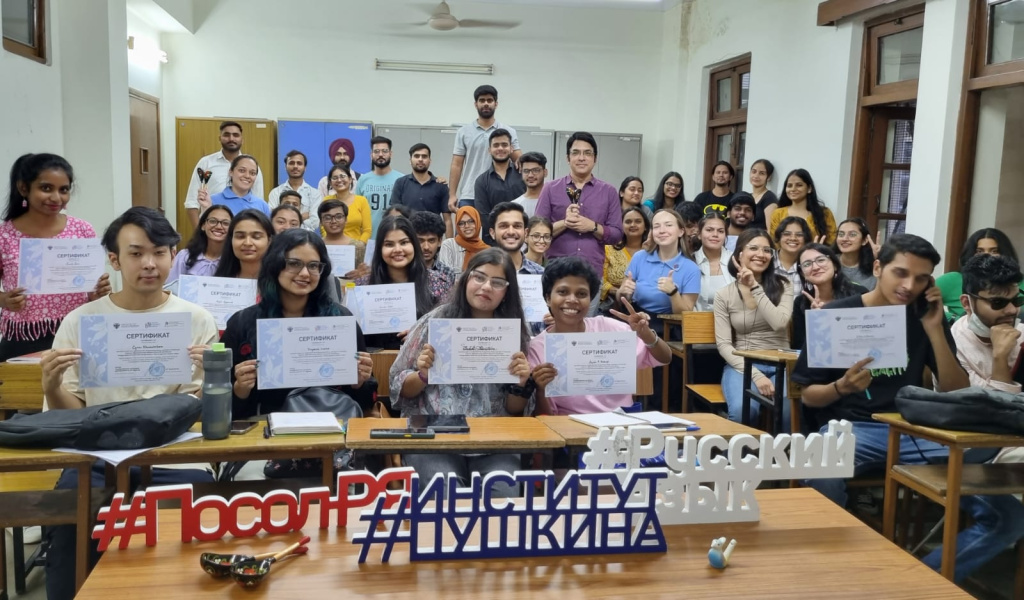
Read also: 16 Gagarins in Moscow village: South India loves Russian writers and Russian names
– Why did you choose Vasily Shukshin? After all, his works are full of racy words and cant term. I suppose it's difficult to translate his works, isn't it?
– The topic of my Candidate's dissertation was "Linguistic and Cultural Aspects in Literary Translation". I analyzed translations of stories by Vasily Shukshin. It was always my desire to translate his works into Hindi as their themes are very familiar to us, for instance, when village life meets urban life, or family relationships.
Truth be told, there are few people who buy translated literature in our country. It is necessary to find a way to reach the readers. I suggested the Institute of Translation to use the potential of audiobooks more actively. Now I am recording audio versions of Leo Tolstoy's stories. Thus, children will be able to listen to these stories and feel interested in them.
It is important to talk more about Russian literature. Let me share my experience. Two years ago, we launched open courses for students in the master's programs of different majors. Currently, 90 participants from other faculties attend the Introduction to Russian Culture. That's a lot. There will be a course on Russian folklore in the fourth semester. I teach in English because these students do not speak Russian. Such courses are very popular. Students listen to lectures about Russian culture with great interest and think more about their culture. This is how the intercultural dialog comes about. Just imagine, a biochemist studies Russian culture and Russian folklore!
This is a new experience for us because such courses were previously offered only to philologists studying the Russian language. I recently attended the Forum of Cultures held in St. Petersburg. I asked Russian teachers and cultural professionals there to develop such a course for the whole of India. If such courses were available in different Indian universities, it would be great. This is my dream. I will work on it. There could also be courses on Russian literature.
Currently, many students from our English department are working on comparisons between Russian culture and the cultures of other countries, for instance, English culture, or cultures of India, since we have many different states.
– Russian film festivals have been held in India lately as well. Do they enjoy interest?
– A while back, we celebrated Leonid Gaidai's centenary in collaboration with the Russian Cultural Center in Delhi. We showed two of his movies to our students and had a quiz on them. It was very interesting. This December or early next year, the Folklore in Cinema Festival will be held with the support of the Russian Embassy. For instance, I really enjoyed The House Elf, a Russian comedy movie. We will also show other movies where myths and superstitions of this kind are given a modern interpretation.
New publications

 Mikhail Kalatozov, a director who transformed the world of cinematography in many ways, was born 120 years ago. He was a Soviet film official and a propagandist. Above all, he was capable of producing movies that struck viewers with their power and poetic language.
Mikhail Kalatozov, a director who transformed the world of cinematography in many ways, was born 120 years ago. He was a Soviet film official and a propagandist. Above all, he was capable of producing movies that struck viewers with their power and poetic language.  Ukrainian authorities have launched a persecution campaign against the canonical Ukrainian Orthodox Church (UOC), the biggest one in the country's modern history. Over the past year, state sanctions were imposed on clergy representatives, searches were conducted in churches, clergymen were arrested, criminal cases were initiated, the activity of the UOC was banned in various regions of the country, and monasteries and churches were seized.
Ukrainian authorities have launched a persecution campaign against the canonical Ukrainian Orthodox Church (UOC), the biggest one in the country's modern history. Over the past year, state sanctions were imposed on clergy representatives, searches were conducted in churches, clergymen were arrested, criminal cases were initiated, the activity of the UOC was banned in various regions of the country, and monasteries and churches were seized.  When Nektary Kotlyaroff, a fourth-generation Russian Australian and founder of the Russian Orthodox Choir in Sydney, first visited Russia, the first person he spoke to was a cab driver at the airport. Having heard that Nektariy's ancestors left Russia more than 100 years ago, the driver was astonished, "How come you haven't forgotten the Russian language?" Nektary Kotlyaroff repeated his answer in an interview with the Russkiy Mir. His affinity to the Orthodox Church (many of his ancestors and relatives were priests) and the traditions of a large Russian family brought from Russia helped him to preserve the Russian language.
When Nektary Kotlyaroff, a fourth-generation Russian Australian and founder of the Russian Orthodox Choir in Sydney, first visited Russia, the first person he spoke to was a cab driver at the airport. Having heard that Nektariy's ancestors left Russia more than 100 years ago, the driver was astonished, "How come you haven't forgotten the Russian language?" Nektary Kotlyaroff repeated his answer in an interview with the Russkiy Mir. His affinity to the Orthodox Church (many of his ancestors and relatives were priests) and the traditions of a large Russian family brought from Russia helped him to preserve the Russian language.

 The leaders of the Friends of the Great Russia cultural association (Amici Della Grande Russia) in Italy believe that the Western policy of abolishing Russian culture in Europe has finally failed. Furthermore, it was doomed to failure from the beginning.
The leaders of the Friends of the Great Russia cultural association (Amici Della Grande Russia) in Italy believe that the Western policy of abolishing Russian culture in Europe has finally failed. Furthermore, it was doomed to failure from the beginning.  Name of Vladimir Nemirovich-Danchenko is inscribed in the history of Russian theater along with Konstantin Stanislavski, the other founding father of the Moscow Art Theater. Nevertheless, Mr. Nemirovich-Danchenko was a renowned writer, playwright, and theater teacher even before their famous meeting in the Slavic Bazaar restaurant. Furthermore, it was Mr. Nemirovich-Danchenko who came up with the idea of establishing a new "people's" theater believing that the theater could become a "department of public education."
Name of Vladimir Nemirovich-Danchenko is inscribed in the history of Russian theater along with Konstantin Stanislavski, the other founding father of the Moscow Art Theater. Nevertheless, Mr. Nemirovich-Danchenko was a renowned writer, playwright, and theater teacher even before their famous meeting in the Slavic Bazaar restaurant. Furthermore, it was Mr. Nemirovich-Danchenko who came up with the idea of establishing a new "people's" theater believing that the theater could become a "department of public education."  "Russia is a thing of which the intellect cannot conceive..." by Fyodor Tyutchev are famous among Russians at least. December marks the 220th anniversary of the poet's birth. Yet, he never considered poetry to be his life's mission and was preoccupied with matters of a global scale. Mr.Tyutchev fought his war focusing on relations between Russia and the West, the origins of mutual misunderstanding, and the origins of Russophobia. When you read his works today, it feels as though he saw things coming in a crystal ball...
"Russia is a thing of which the intellect cannot conceive..." by Fyodor Tyutchev are famous among Russians at least. December marks the 220th anniversary of the poet's birth. Yet, he never considered poetry to be his life's mission and was preoccupied with matters of a global scale. Mr.Tyutchev fought his war focusing on relations between Russia and the West, the origins of mutual misunderstanding, and the origins of Russophobia. When you read his works today, it feels as though he saw things coming in a crystal ball...